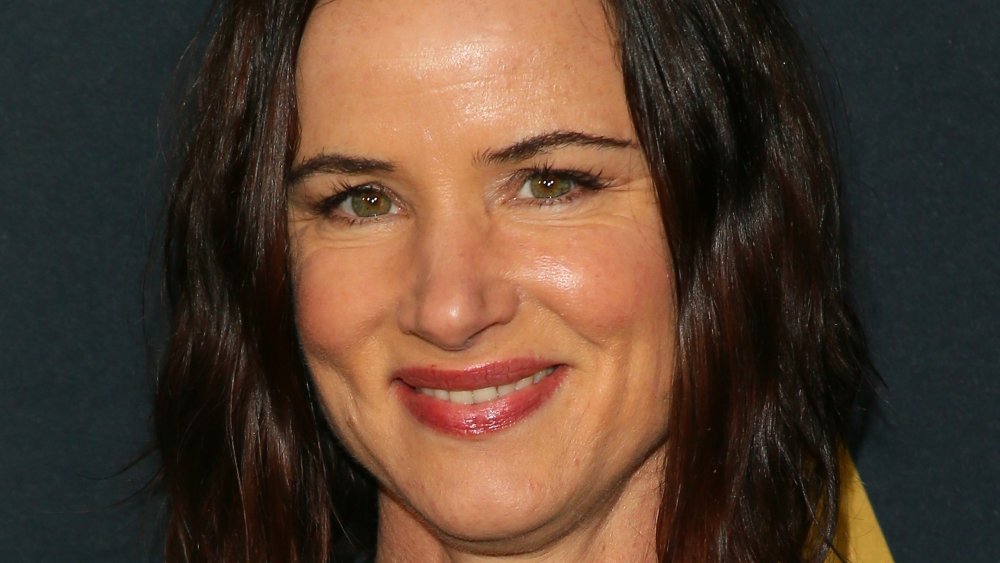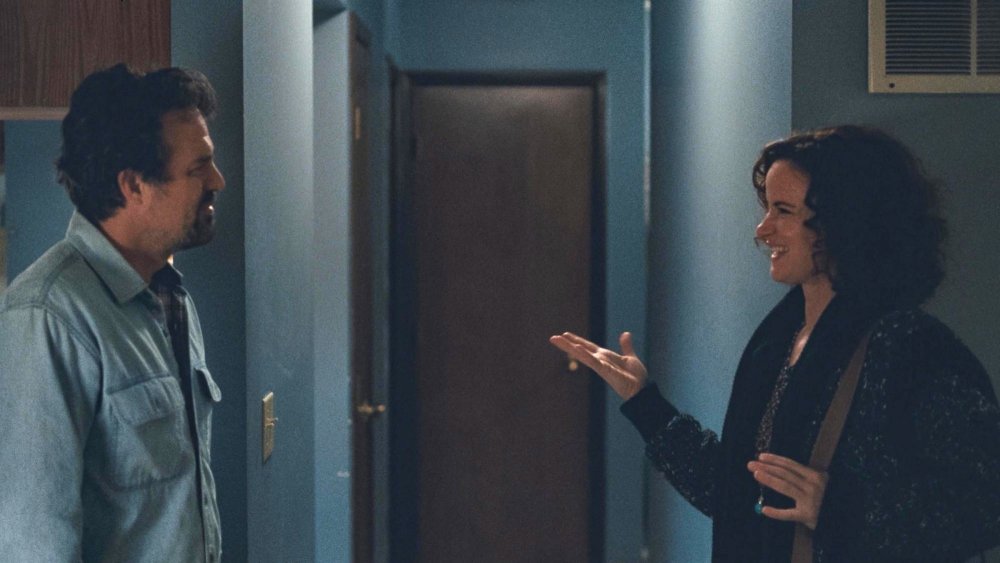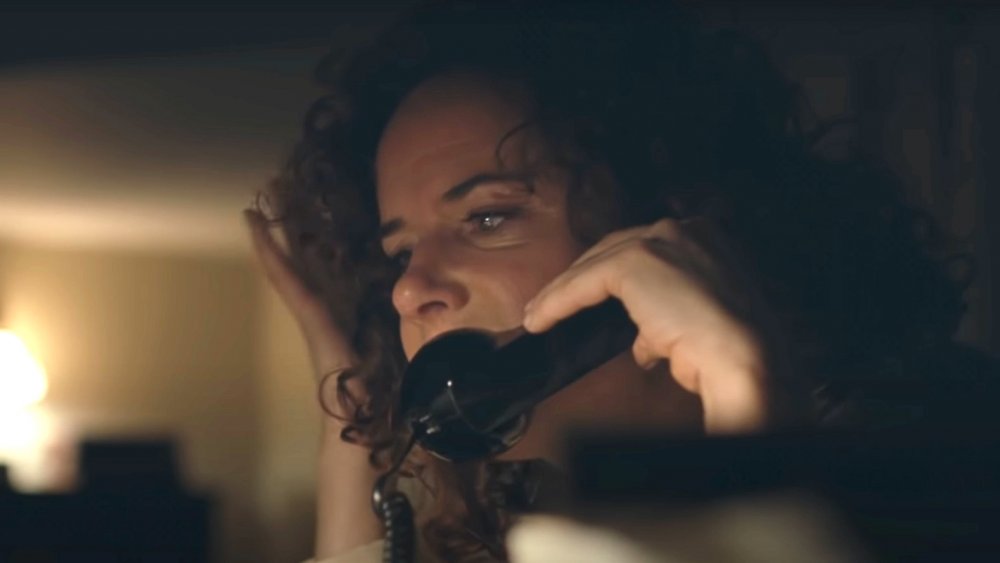Juliette Lewis Opens Up About I Know This Much Is True - Exclusive Interview
Martin Scorsese. Woody Allen. Oliver Stone. Kathryn Bigelow. Nora Ephron. Robert Rodriguez. Todd Phillips. Those aren't just some of the most well-known filmmakers of the modern era, they're also just a few of the filmmakers that Juliette Lewis, who you probably know from movies as eclectic as Natural Born Killers to Old School, has worked with over her over-30-year career.
With I Know This Much Is True, an HBO miniseries based on Wally Lamb's novel of the same name, Lewis can add another name to the list: Derek Cianfrance, the writer-director behind Blue Valentine and The Place Beyond the Pines. While the series stars Mark Ruffalo as both Dominick Birdsey and his schizophrenic twin brother Thomas, Lewis has a small but important role as Nedra Frank, an academic who Dominick hires to translate his grandfather's memoir, hoping to uncover some secrets about his family's troubled past.
Shortly before the premiere of I Know This Much Is True's first episode, which contains Lewis' most memorable scenes, the veteran actor took a few minutes to chat with Looper about what it's like to work with Mark Ruffalo, how Cianfrance is different from other directors, and what's really going on in Nedra's addled head. Here's what she had to say.
Juliette Lewis explains what it was like working with Mark Ruffalo on I Know This Much Is True
You've done comedies, you done dramas, you've done pretty much everything in between. What did you get to do in I Know This Much Is True that you hadn't before?
Everything I do, I always want to play a character that I've never played. So, Nedra Frank, from how she talks to the way she behaves, the way she looks visually, I love everything about it. What she adds to the story, she's like this little hurricane that passes through Dominick's life.
It was funny to play a character that is so much the center of her own universe. We meet people like this. The second you meet them you get a feeling of the pace of their neurosis. It just builds out from them, even if they're trying to contain it, like Nedra is with academia and her professionalism and how self-important she is. But it's interesting.
I just loved her visually. I loved working out all this stuff. Visually, meaning the curly hair. I was like, "I want curly hair. I want messy." So, we had to kink that hair. I don't have curly hair, so we had to find that. And you work with your director and you want to make it all look organic and real and not stylized.
And Derek had assembled such a beautiful creative team. I had worked with the wardrobe, a girl, Kasia before. I worked with her on a Mira Nair movie I had done, and then Mark, I worked with him when he was a director. But then we acted together and we got to do lots of improv. Derek, the director, loves lots of takes, and this is radical in TV shows. You don't get the kind of time to creatively explore. So, it was really exciting.
You've said that you didn't read the book I Know This Much Is True is based on, so what drew you to this story?
Everything about it. The exploration into a man's mythology, which is Dominick's story and the relationship with his brother. When you love someone and they have their truth but it's disruptive and destructive, and he loves him and there's a partnership. You feel obligated to protect them. Everything about it was really special.
And Derek, the director, after meeting him I was so excited by his process and how he's into creative dare-deviling and discovery. Again, I've been in this business for 30 years, and the way Derek worked reminded me of the auteur filmmakers I came up with. And Mark. There are actors you work with, you're like, "Yes, we are kindred." We have a mutual way in which we are versed in naturalism or whatever. I'm a huge fan of Mark.
As a scene partner, what makes Mark Ruffalo unique?
He's a great. He's a great. When you work with a great, they're just fully alive, they're fully present. You have two characters that are totally in different worlds, you know? And Nedra is working out all her anger towards men. Dominick is an angry, macho guy, working out his mythologies or whatever, and they're meeting each other under professional circumstances like, "Hey, can you translate my manuscripts?"
And the dance that unfolds so bizarre, and it's because Nedra is projecting. It was so classic because she's projecting all her resentments of, "You men do this, and you always do this," but she is doing all of that. She's objectifying him. She's after one thing, you know what I mean? It was so funny to play that kind of person.
How Juliette Lewis got inside Nedra's head for I Know This Much Is true
We don't really end up learning much about Nedra during the show. What did you do to develop that character and bring an internal life to a character that is not necessarily in the text?
It's really fun when you do a thing like this, a train that's already moving and you're on the thing for this much of the journey. So, that is very much, I have to find out what is her life like that week. You meet people and you're meeting them at a certain stage and there's a certain energy. I'm really tapped into the energy of a personality.
And for me, what was important is her stress. She was stressed. I interviewed women who are assistants trying to make professor. This is in the late '80s. It's not that evolved now, and it certainly wasn't then. It's very male dominated. So, you're competitive. In the world of academia, you're trying to prove yourself, and you can get lost in that world for years, of just schooling. And sometimes people use it to avoid things in their life. So, there is all that information.
Is there anything about Nedra that you relate to?
I don't know. I guess I relate to humanity, in every character I play, the humanity of the person. So, meaning, have I been stressed? Have I under-slept? Have I been dysfunctional? All these things, that's what she is. But she's also really competent. I feel like she is educated, she is studied and good at what she does.
And so, I get those qualities, but I also related to getting it wrong. We talked a lot about that, Derek and Mark and myself, about missing the signs, when you're on a date or a non-date and you're thinking you're seeing a sign that didn't really exist, and the fumbling. That stuff. The human awkwardness. We all have stories of that, and I love that type of stuff.
Your director, Derek Cianfrance, is known for getting amazing performances out of his actors. What was the biggest lesson that you learned from working with him?
To break up your patterns. The most exciting, fresh experiences you can have, maybe in life but certainly creatively, is to unknow what you know. So, for me, Derek didn't use "Action" and, "Cut," and I'd think, okay, what is that? What I thought was like, okay, well I love "Action" and "Cut." It is how I set myself. Okay, well how about unlearning that, and then get into the danger of not knowing again? It's exciting.
I would come onto the set, they mic you, they're zhuzhing you, you're fixing your hair, getting your props, and then you flow. So, what I talked to Derek about is flow. You're getting into this creative flow that might have become too structuralized in experience, if you know what I mean. He's radical, but awesome.


